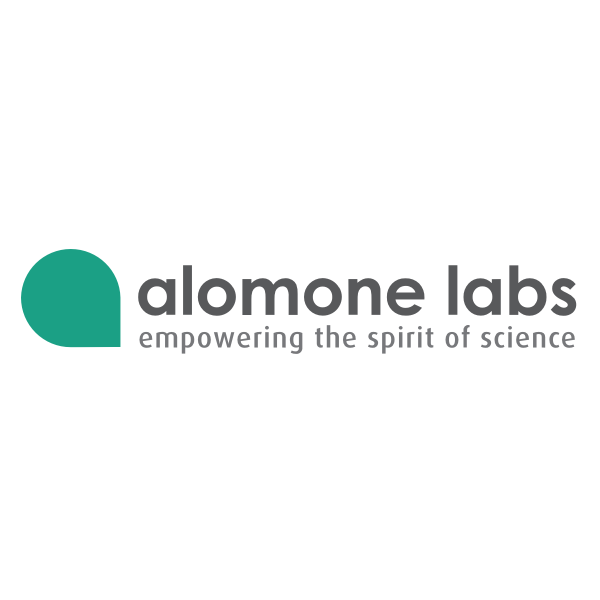

品牌: Alomone
 下载产品说明书
下载产品说明书 用小程序,查商品更便捷
用小程序,查商品更便捷



 收藏
收藏
 对比
对比 咨询
咨询纯度:
Affinity purified on immobilized peptide.
Affinity purified on immobilized peptide.
反应种属:
H, M, R
H, M, R
产品介绍
产品信息
纯化方式
Affinity purified on immobilized antigen.

宿主
Rabbit

免疫原
Peptide (C)SNQLQSSEDEPAFVSK, corresponding to amino acid residues 454-469 of rat KV4.2 (Accession Q63881). Intracellular, C-terminus.

简单描述
A Rabbit Polyclonal Antibody to KV4.2 Channel

商品描述
Anti-KV4.2 Antibody (#APC-023) is a highly specific antibody directed against an epitope of the rat protein. The antibody can be used in western blot, immunoprecipitation, immunocytochemistry, and immunohistochemistry applications. It has been designed to recognize KV4.2 from human, rat, and mouse samples.

同种型
Rabbit IgG.

纯度
Affinity purified on immobilized peptide.

形式
Lyophilized

组成成分
电压门控性钾通道蛋白抗体;磷酸盐缓冲液;防腐剂(0.05%叠氮化钠溶液)

基因
KCND2

应用
实验应用
ICC, IF, IHC, IP, WB

反应种属
H, M, R

背景
别名
Voltage-gated potassium channel subfamily D member 2, KCND2, Shal1, RK5

背景
KV4.2 is a voltage-dependent K+ channel that belongs to the Shal channel subfamily and includes two other members: KV4.1 and KV4.3.1
KV4.2 possesses the signature structure of the voltage-dependent K+ channels: six membrane-spanning domains with intracellular N and C termini. As with other members of the voltage-gated K+ channel superfamily, the functional channel is a tetramer that can be composed of more than one member of the Shal subfamily, i.e. heterotetramers of KV4.1 and KV4.3.
The KV4 channels are characterized by activation at subthreshold membrane potentials, inactivate rapidly and recover from inactivation quickly compared with other voltage-dependent K+ channels. This type of current is known as transient A-type K+ currents. For example, depolarization-activated K+ currents in rat neostriatal cholinergic interneurons are predominantly of the A-type and attributable to coexpression of KV4.2 and KV4.1 subunits.2
The biophysical properties of the Kv4.2 subunit can be modified by its association with auxiliary β subunits such as the KChIP family that increase KV4.2 current densities and accelerates both the inactivation and the recovery time.
KV4.2 is also highly expressed in the heart where together with Kv4.3 underlie the fast inactivating and recovering cardiac transient outward current Ito.3
Several toxins from spider venoms are potent blockers (affecting the channels in the nanomolar range) of KV4.2 channels. Among these the most potent and selective are Stromatoxin-1 (#STS-350), (1.2 nM), Phrixotoxin-1 (#STP-700), (5 nM), Phrixotoxin-2 (#P-700), (34 nM) and Heteropodatoxin-2 (#STH-340), (100 nM).4
KV4.2 possesses the signature structure of the voltage-dependent K+ channels: six membrane-spanning domains with intracellular N and C termini. As with other members of the voltage-gated K+ channel superfamily, the functional channel is a tetramer that can be composed of more than one member of the Shal subfamily, i.e. heterotetramers of KV4.1 and KV4.3.
The KV4 channels are characterized by activation at subthreshold membrane potentials, inactivate rapidly and recover from inactivation quickly compared with other voltage-dependent K+ channels. This type of current is known as transient A-type K+ currents. For example, depolarization-activated K+ currents in rat neostriatal cholinergic interneurons are predominantly of the A-type and attributable to coexpression of KV4.2 and KV4.1 subunits.2
The biophysical properties of the Kv4.2 subunit can be modified by its association with auxiliary β subunits such as the KChIP family that increase KV4.2 current densities and accelerates both the inactivation and the recovery time.
KV4.2 is also highly expressed in the heart where together with Kv4.3 underlie the fast inactivating and recovering cardiac transient outward current Ito.3
Several toxins from spider venoms are potent blockers (affecting the channels in the nanomolar range) of KV4.2 channels. Among these the most potent and selective are Stromatoxin-1 (#STS-350), (1.2 nM), Phrixotoxin-1 (#STP-700), (5 nM), Phrixotoxin-2 (#P-700), (34 nM) and Heteropodatoxin-2 (#STH-340), (100 nM).4

制备和贮存
溶解方法
25 µl, 50 μl or 0.2 ml double distilled water (DDW), depending on the sample size.

保存方式
The antibody ships as a lyophilized powder at room temperature. Upon arrival, it should be stored at -20°C.
数据库链接
Entrez-Gene ID
65180

UniProt ID
Q63881

研究资源识别码
AB_2040176.

声明 :本官网所有报价均为常温或者蓝冰运输价格,如有产品需要干冰运输,需另外加收干冰运输费。








 危险品化学品经营许可证(不带存储) 许可证编号:沪(杨)应急管危经许[2022]202944(QY)
危险品化学品经营许可证(不带存储) 许可证编号:沪(杨)应急管危经许[2022]202944(QY)  营业执照(三证合一)
营业执照(三证合一)